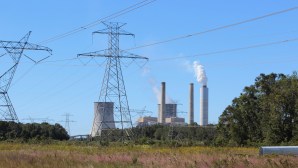As organizations and agencies nationwide make strides toward more efficient energy use, they’ve reached a state of gridlock, according to a panel of experts speaking Tuesday at the 2014 Energy Efficiency Global Forum.
The panelists claimed that current federal policies are barring progress in industrial energy efficiency. But like much of the industry, none of the experts on the panel could offer any concrete ideas for how the country could fix the problem.
Rick Tempchin, the executive director for retail energy services at Edison Electric Institute, pointed to technology and innovation as the best paths to efficiency.
Massive solar panels, advanced energy storage, smartphone apps and other high-tech tools are “shaping the future in how energy is delivered and used and managed,” Tempchin said.
Much of the innovation in the energy efficiency space, Tempchin said, comes from merging previously separate components of the infrastructure with two-way communications, ultimately “forming an intelligent grid.”
But not everyone agreed completely. Though Manlio Valdés, president of compressed air systems for Ingersoll Rand, acknowledged the importance of technology in pushing the industry forward, he emphasized the “here and now,” rather than the future, as a way to solve efficiency problems.
“A lot of the gains are in the low-tech world,” Valdés said, such as educating the workforce. “A heavy focus at the systemic level would help us.”
Participants continued to offer potential solutions, many they’ve experienced firsthand:
“If companies are required to disclose their information in a transparent way, we will see improvements,” said Jigar Shah, executive director at the Institute for Industrial Productivity. He also mentioned incentivizing utility companies and encouraging them to benchmark their progress against one another.
Ross Eisenberg of the National Association of Manufacturers said the federal government could make a difference by supporting education and clarifying regulations.
But he quickly cautioned, “We’re in a town where getting things done isn’t so easy.”
Although the panelists focused on innovation and systemic change, they also said legislation could play an important role in improving energy efficiency. They mentioned the Energy Savings and Industrial Competitiveness Act, recently derailed in Congress, as one example.
But when it came to the question of how to make it all stick — how to effect change — there were no clear answers.




